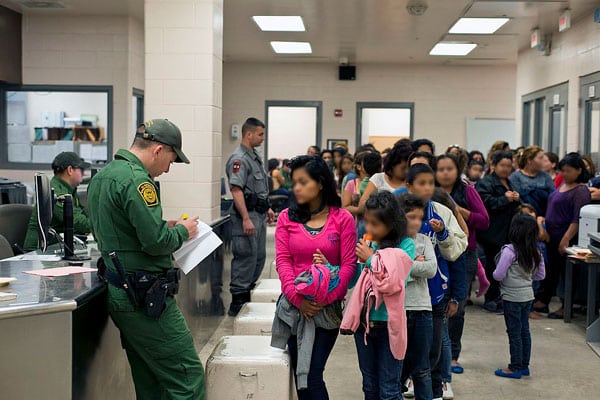
June 27, 2018; Washington Post
Over 2,000 kids remain separated from their families, thanks to the brief and horrible period in which US border agents systematically separated immigrant families. After an outcry from all over the world, the policy was rescinded, but now the government has a responsibility to reunite those kids with their parents.
According to Isaac Stanley-Becker and Devlin Barrett of the Washington Post, the government said “Trump’s order, which followed days of bipartisan outcry, had resolved the concerns animating the [law]suit” against family separation that was filed by the ACLU. As NPQ detailed last week, the order did no such thing; among other failures, it made no mention of the 2,300 kids already in detention without their parents. Seventeen states sued the Trump administration, demanding that it take action to reunite families.
Judge Dana M. Sabraw of the United States District Court for the Southern District of California issued a preliminary injunction in the ACLU suit requiring that all children must be reunited with their parents within 30 days, or within 14 days if they’re younger than five years old.
The problem is, there isn’t a system designed to deal with this situation. No prior family separations perpetrated by the US government have been reversed so quickly. Judge Sabraw’s injunction reads,
Measures were not in place to provide for communication between governmental agencies responsible for detaining parents and those responsible for housing children, or to provide for ready communication between separated parents and children. There was no reunification plan in place, and families have been separated for months…The unfortunate reality is that under the present system, migrant children are not accounted for with the same efficiency and accuracy as property.
Meanwhile, the children remain in detention centers around the country, which are being paid well by the federal government. The nonprofit Southwest Key runs a shelter that’s famously operated out of an old Walmart. They used to primarily house minors who arrived in the US alone, but they’ve accepted a large number of the recently separated children, for which they’ve been criticized by former allies.
Sign up for our free newsletters
Subscribe to NPQ's newsletters to have our top stories delivered directly to your inbox.
By signing up, you agree to our privacy policy and terms of use, and to receive messages from NPQ and our partners.
Kandace Vallejo, executive director of Youth Rise Texas, told NPR’s Camila Domonoske she was “shocked” to find Southwest Key was accepting the separated migrant kids. She questions the shelters’ operations and has so far declined to work with them. Diana Gómez, who visited a shelter as part of her work, said that she felt centers “seemed ill-equipped to handle the level of trauma…I think [Southwest Key] saw a way to make money—so much of it.” This calendar year, Southwest Key has booked $458 million worth of contracts with the government. Domonoske pointed out, “CNN reports that [Southwest Key founder and CEO Juan] Sanchez’s $1.5 million annual salary makes him one of the highest-paid nonprofit CEOs in the country.”
Sanchez said, “Somebody has to take care of them,” and his organization will do a better job than federal agencies. He told Domonoske, “I wish people were saying, ‘Thank you—thank you for growing the way that you have, because if you didn’t, those kids would stay in those ICE detention facilities for days, weeks, months at a time.’”
Some concerning reports are emerging from the detention centers. Colleen Kraft of the American Academy of Pediatrics told Kristine Phillips at the Washington Post that she saw centers where staff were not allowed to hug or physically comfort children, some of whom are babies and toddlers. Antar Davidson, a former employee at Southwest Key, published an op-ed in Mother Jones about what he saw. He wrote,
When a shift leader told me to tell a group of kids they couldn’t hug, it confirmed to me something that I had been feeling for a while: This wasn’t the humanitarian nonprofit that it was claiming to be. It was a private prison for youth that is extremely lucrative. One of the main characteristics of a system like that is a lack of compassion.
A lack of compassion is one of the main characteristics of this entire situation, from the “zero tolerance” migration policy, to the increasing difficulty of qualifying for asylum in the US, to the language used to describe people coming across the border. Something stronger seems needed to describe the ability to take a toddler from its mother’s arms. One Norfolk nonprofit, recognizing the kids’ need for emotional care, sent 1,000 postcards with messages of love.
Now some of the chaos and confusion inflicted on families by ICE is coming home to roost, as the federal government attempts to scramble back over the problem it created by separating so many people so fast and with so little coordination. John Sandweg, a former acting director of ICE, said, “Frankly, it can take weeks for HHS to locate a family member…The younger the kid is, the harder that is.”
Judge Sabraw is going to require HHS to speed up the process. In fact, he may have indicated a more all-encompassing ruling to come when he wrote, “Although parents and children may lawfully be separated when the parent is placed in criminal custody, the same general rule does not apply when a parent and child present together lawfully at a port of entry seeking asylum. In that situation, the parent has committed no crime.” It’s a hopeful note to sound, especially in light of yesterday’s travel ban ruling, and nonprofits like the ACLU will need to keep an eye on it so we never again have to scramble to reunite families in this way.—Erin Rubin












